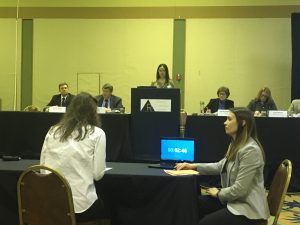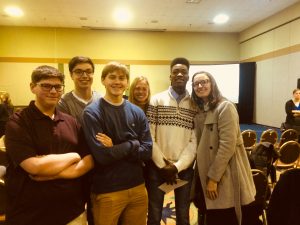March 25, 2019
Using science to speak truth to power
Posted by bwebster
Today’s post was written by Dr. Bonnie McGill. Dr. McGill is a David H. Smith Conservation Fellow and postdoctoral researcher at the University of Kansas.
Some people ooh and aah over movie stars on the red carpet. Me? I idolize scientists providing testimony in Congress. Some personal favorites include Dr. James Hansen’s 1988 Senate testimony on global warming and Dr. Mona Hanna-Attisha and others’ 2016 House testimony regarding lead-contaminated drinking water in Flint, Michigan. These scientists took the risk of speaking truth to power and helped steer policy toward protecting environmental and human health.
You might think that only scientists with tenure, hundreds of publications, thousands of citations, and a secret super power can testify before Congress, but this is not the case. You too can participate in democracy as a scientist with none of those credentials—take me for example.
In February 2019 the EPA opened the public comment period for the Trump administrations’ proposed Waters of the United States (WOTUS) rule, which would strip away protections for headwater streams and wetlands under the Clean Water Act. I thought, too bad I can’t help…or can I?
Hey, I reminded myself, I worked my keister off for a Ph.D. in biogeochemistry to lend an expert voice on this very thing. When I looked into providing public comment online, I noticed that the one public hearing the EPA and Army Corps of Engineers offered was in Kansas City, MO. Living just 45 minutes away in Lawrence, KS, I knew I had to go.
The difference between my testimony and the famous people above is that they were invited to testify because they are authorities in their fields. In my case, the EPA and the Army were soliciting public comment in three-minute slots and anyone could sign-up, including myself.
I asked my current advisor for help figuring out what to say. I felt under-qualified because I am not an expert on the Clean Water Act or the proposed rule change. My advisor shared with me a recent report providing a scientific rebuttal to the proposed WOTUS rule. I found that I am qualified to understand the technical details of the proposed rule and how it would impact water quality. I chose what I felt was most important to emphasize in my testimony and translated it for an audience of government administrators.
But three minutes? If I speak at 130 words per minute, that’s just 390 words! So I knew I had to aim for the heart and get to it fast. My strategy was to first briefly establish my credentials—if you are going to mention your institutional affiliation, be sure to get their approval to do so.
I then made my testimony personal, explaining why protecting water is important to me using one-sentence stories like how I grew up in Appalachia where we could not drink our well water.
I broke the rest of my message into two main points that I supported with eye-catching data. Finally, I closed by restating my two points. Following my testimony, I provided a packet with a hard copy of my remarks and the cited articles. You can read my full testimony here.
Participating in this hearing gave me the opportunity to connect with others who cared about protecting our nation’s water, including representatives from the American Fisheries Society and Clean Water America, and an inspirational group of high school students from Maize, Kansas. I continue to advocate for the scientific basis of WOTUS by submitting a version of my testimony as op-eds in local newspapers.
Even though there was no red carpet, I enjoyed being a part of democracy in action and speaking up for clean water.
The public comment period for the proposed WOTUS rule ends April 15. To submit comments go to www.regulations.gov and search for Docket ID No. EPA-HQ-OW-2018-0149.





Dr. McGill,
Thank you for doing this. The science supporting the WOTUS rule issued by the prior administration is summarized in a special issue of the JAWRA (April 2018) which clearly supported the protection of headwaters. You might want to have a look.
Dave Goodrich